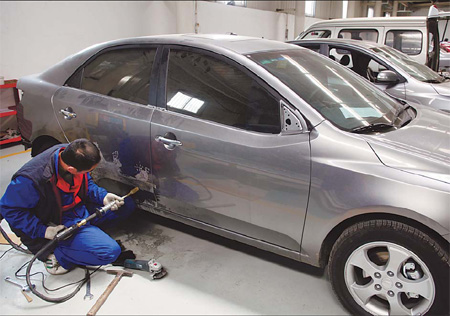Top Stories
Mechanics 'overcharging'
By Wang Chao (China Daily)
Updated: 2010-03-16 09:58
 |
Large Medium Small |
|
 A worker repairs a car at a 4S store in Beijing. Wang Jing / China Daily |
With growing car ownership in the city, vehicle maintenance and repair has become a huge source of profit, industry sources said.
"Revenue earned from car sales is dropping quickly, so 4S stores (sales, service, spare parts and survey) are expanding their services into areas like car repairs and the replacement of spare parts," said Guo Yong, director of the information center of Yayuncun Auto Market.
In China, the negotiation power of car manufacturers is much stronger than that of distributors, Guo said, adding that if the market is bad, dealers have to withstand the loss themselves.
"Since distributors like 4S stores can't bargain much with manufacturers, they need to make money from the service market," he said.
Replacement of spare parts can contribute as much as 50 percent of earnings at some 4S stores in Beijing, according to an auto expert Jia Xinguang.
"I cannot estimate the average percentage that services contribute to total revenue in 4S stores, because it varies from brand to brand," Jia told METRO.
"But for low-end cars and those that enjoy less popularity, the revenues depend more on services because the revenue from the sale is minimal," Jia said.
"It is a well-known secret among car owners that 4S stores charge much more than regular auto repair stores," said Yan Jinlong, owner of a BYD brand name car.
"For example, it usually costs about 100 yuan to do maintenance in a non-4S store, but 400 to 500 yuan to do the same service in a 4S store."
Yan said he was convinced to replace his tires several times by staff at a 4S store, even when there wasn't any big problem with my tires, they still convinced me to replace them.
Yan said a single tire cost him 400 yuan, while a similar one found in an auto repair market would have been priced at only 200 yuan.
A worker surnamed Wu, who claims to have worked in a 4S store for several years, said in an interview with Beijing Morning Post that "replacement instead of repair" is a common practice of 4S stores to earn money.
"For example, if there is something wrong with the meter, workers in 4S stores will try to persuade customers to replace it and charge more than 2,000 yuan. It can usually be fixed with a little welding, which would only cost about 200 yuan," he said.
Most customers who go to 4S stores state "safety" as their major consideration, despite the high charges incurred.
"It does cost much more, but at least I can guarantee it is an authentic part," Yan said. Yan bought his car in 2007 in a 4S store on the Fourth Ring Road.
However, an expert said some 4S stores purchase spare parts from common auto parts stores.
"On paper, 4S stores are not allowed to buy spare parts from stores other than the auto manufactures. In reality though, some still do wholesale purchases in auto parts market to cut costs," said Guo with Yayuncun Auto Market.
Guo noted that this act varied from store to store, since different brands have different requirements.
"'Authentic' does not have an absolute standard," Zhao Ying, director of industrial development office in Institute of Industrial Economics, the Chinese Academy of Social Sciences, told METRO.
"Factories produce two types of spare part: one for cars and one for repairs," he said.
"If auto parts stores buy repair parts from these factories, they are actually selling the same thing as 4S stores."
Wang Yongzhan, executive director of Beijing Auto Parts Industry Association, agreed with Zhao.
"When purchasing spare parts from factories, they tend to produce 10 to 20 percent more than necessary. These parts are then sold by their staff to auto parts markets in secretive ways," Wang told Beijing Morning Post.
According to Wang, car manufacturers usually raise the price by 30 percent when selling on to 4S stores, at which point 4S stores add at least another 30 percent before they reach the customer.







